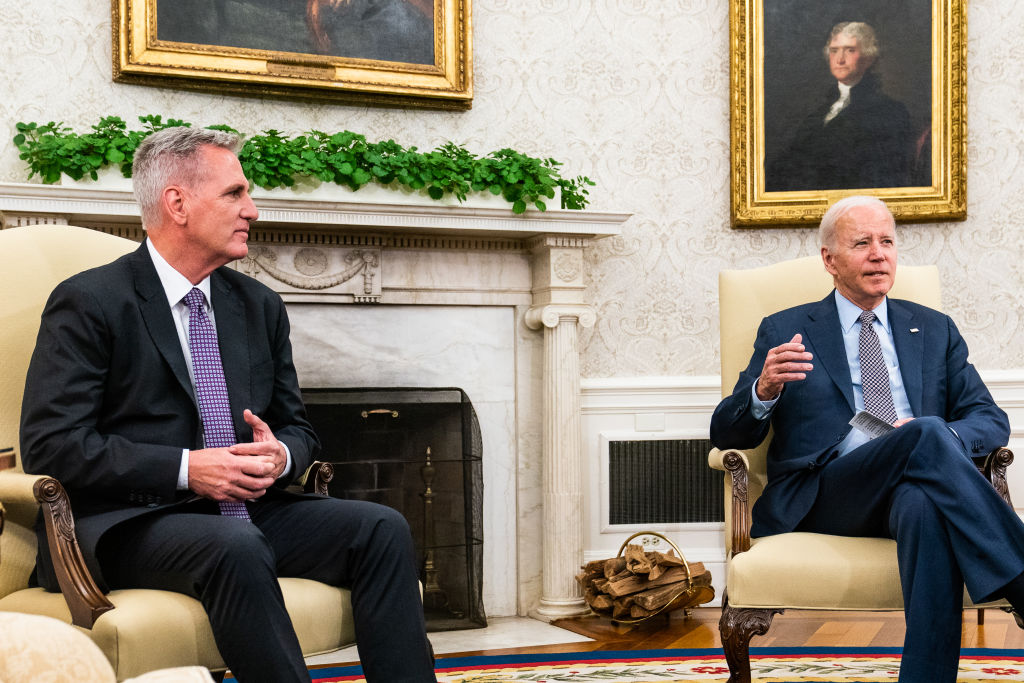Republicans and Democrats still haven’t hammered out a deal to raise the debt ceiling and avert the financial catastrophe that could accompany a default on the national debt.
House Speaker Kevin McCarthy and President Joe Biden are continuing to negotiate, but the range of potential outcomes goes beyond a default/no default binary. With eight days before the projected “X-date,” here are five possible outcomes.
1. A deal comes together in time.
Democrats and Republicans have been at odds over conditions for raising the debt ceiling since this session of Congress began in January. Democrats wanted a clean debt ceiling hike while Republicans demanded a series of spending cuts. But a divided Congress means a deal will require buy-in from both sides.
But if Biden and McCarthy do come to an agreement—which could involve capping spending growth, reclaiming unused COVID relief funds, adding work requirements to some welfare programs, and reforming the permitting process for energy projects—the resulting legislation would have good odds of becoming law, albeit with defections from both parties’ ideological extremes.
“Congress has been in this situation before; it has come down to the wire repeatedly,” said Rachel Snyderman, a senior associate director of business and economic policy at the Bipartisan Policy Center. “I have every reason to believe that, even if a deal was struck at the eleventh hour, Congress could find a way to circumvent crossing the X-date.”
Senate Minority Leader Mitch McConnell, who has left negotiating to McCarthy and Biden, agrees. “This is not that unusual. It is almost entirely required when you have divided government,” he told reporters Tuesday. “Regardless of what may be said about the talks on a day-to-day basis, the president and the speaker will reach an agreement and it will ultimately be passed on a bipartisan vote in both the House and the Senate.”
2. A deal comes late.
Writing and passing legislation takes time, and the clock is ticking. On Monday, McCarthy said a deal needs to come together this week and expressed opposition to the idea of a short-term suspension to buy more time. But if negotiations drag into next week, he might have to convince his party there’s no other choice.
In this scenario, the broad contours of a longer-term deal would likely have already been agreed to, but without “the legislative text and the votes rounded up in time,” said Ben Ritz, an economic policy analyst at the Progressive Policy Institute. Thus, the parties might agree to a short-term extension while final details come together. House rules dictate that 72 hours elapse between the text of a bill being released and a vote on passage; for now, McCarthy has insisted that won’t change.
3. The X-date moves.
Because of the “lumpy” nature of Treasury receipts and disbursements, X-date projections are contingent and probabilistic. In theory, there’s some wiggle room. If enough tax revenue were to come in over the next week, that could kick the X-date can down the road until mid-June, when an influx of quarterly tax revenue could kick it further to June 30, allowing the Treasury Department to open up new, time-bound extraordinary measures “to make good on our obligations through at least early July and perhaps several weeks beyond,” according to a Bipartisan Policy Project analysis.
But don’t count on it. Weather-related delays in tax filing have contributed to a roughly $300 billion shortfall, and Treasury Secretary Janet Yellen is adamant that it is “highly likely” the X-date will come in “early June, and potentially as early as June 1.”
4. Biden attempts to invoke the 14th Amendment.
Without a legislative solution raising the debt ceiling, some federal laws would end up in direct conflict with one another: Borrowing beyond the limit set by Congress in 2021 would be illegal, but so would the administration’s refusal to spend money Congress has already appropriated.
That’s why some analysts and elected officials have speculated about gimmicky workarounds the executive branch could use to prevent a crisis. Biden has said he believes he has the authority to invoke the public debt clause of the 14th Amendment to keep the borrowing spigot open—but he is hesitant to use it, and Yellen has said the untested legal theory could trigger a “constitutional crisis.”
The idea has been floated during past debt ceiling standoffs, but there’s a reason no president has tried it: It’s backed by a dubious legal argument. The 14th Amendment, ratified in 1868, predates the modern debt ceiling. And the clause in question has to do with the “validity” of the public debt itself, not with whether it is “unconstitutional for the United States to run out of money,” former federal Judge Michael McConnell wrote in the New York Times last week.
“I don’t think it’s the get-out-of-jail-free card that a lot of progressives think it is,” Ritz said.
The move would be unprecedented, so no one knows for sure what it would look like in practice. Plus, even if the Biden administration issued a legal opinion purporting to allow the Treasury to continue borrowing money to pay bills, it wouldn’t really be business as usual. Any new bonds issued after the X-date could later be deemed invalid by the courts, and the elevated risk of those investments would be reflected in higher interest rates.
Even though it would come with a “good chunk of the negative ramifications” of default, the 14th Amendment option could be somewhat less bad for the economy than a true default. And the legal argument for doing so could be more robust than the rationale the administration used for its student loan forgiveness plan last year, according to Ritz.
“If the administration was willing to play constitutional roulette with student debt cancellation, which was both worse policy and more legally dubious, there is no reason why they shouldn’t be willing to do the same for the 14th Amendment, given the both better legal underpinning and the more important policy implications,” Ritz said.
But the administration would likely only pursue the idea if it was clearly the least-disruptive option. “Right now, it would inject more volatility into the market than it would bring answers or solutions,” Snyderman said.
5. The X-date comes with no deal.
Despite House Republicans’ wishes to the contrary, the Treasury does not have the capacity to prioritize certain payments over others—there’s no algorithm to make sure Social Security checks go out before payments to defense contractors, for example—though Snyderman said it’s at least plausible that the Treasury could make debt payments on time while putting all other payments on a delay. That might not technically be considered a default on the debt. But if the X-date arrives with no deal and Biden decides not to risk pursuing the 14th Amendment, all bets are off.
“If we were in such a situation, the market reactions would be so immediate and so widespread that it would force Congress’ hand to take action,” Snyderman said. A recession would be likely. The United States’ credit rating would almost certainly be downgraded, and interest rates on Treasury securities would shoot up, with immediate ripple effects throughout the economy that would put pressure on everyday taxpayers.
“There are not only financial and true economic risks associated with it, but there’s a political optics issue that will force a deal,” Snyderman said.
Because the debt ceiling is Congress’ creation and responsibility, Congress will eventually vote to raise the limit. The question is how painful it will be.






Please note that we at The Dispatch hold ourselves, our work, and our commenters to a higher standard than other places on the internet. We welcome comments that foster genuine debate or discussion—including comments critical of us or our work—but responses that include ad hominem attacks on fellow Dispatch members or are intended to stoke fear and anger may be moderated.
With your membership, you only have the ability to comment on The Morning Dispatch articles. Consider upgrading to join the conversation everywhere.